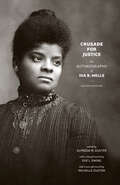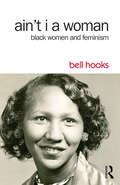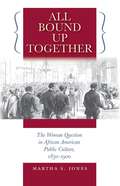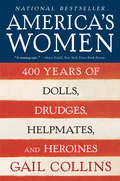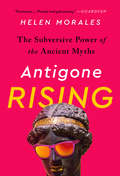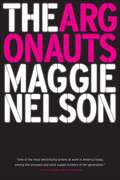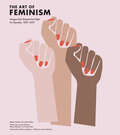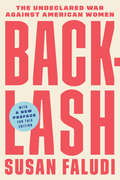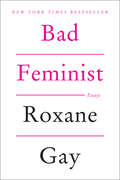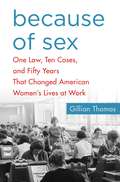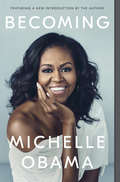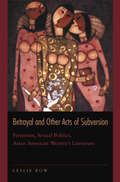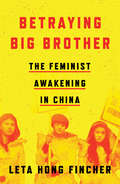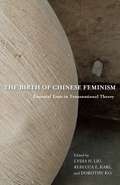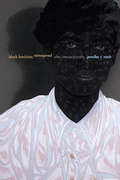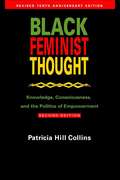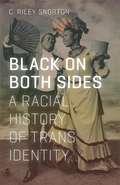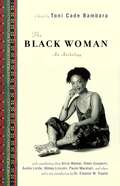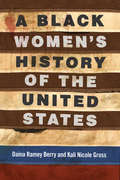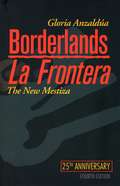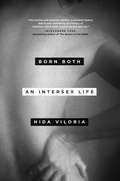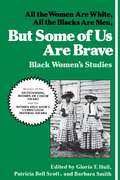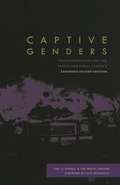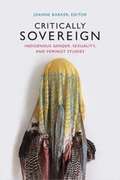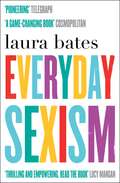Special Collections
NYPL's 2020 Essential Reads on Feminism for Adults
Description: This NYPL list includes first-hand accounts and histories of the suffrage movement that chronicle both its successes and its limitations, as well as contemporary essays on how feminism intersects with race, class, education, and LGBTQ+ activism. #adults
- Table View
- List View
Crusade for Justice
by Ida B. Wells“She fought a lonely and almost single-handed fight, with the single-mindedness of a crusader, long before men or women of any race entered the arena; and the measure of success she achieved goes far beyond the credit she has been given in the history of the country.”—Alfreda M. Duster
Ida B. Wells is an American icon of truth telling. Born to slaves, she was a pioneer of investigative journalism, a crusader against lynching, and a tireless advocate for suffrage, both for women and for African Americans. She co-founded the NAACP, started the Alpha Suffrage Club in Chicago, and was a leader in the early civil rights movement, working alongside W. E. B. Du Bois, Madam C. J. Walker, Mary Church Terrell, Frederick Douglass, and Susan B. Anthony.
This engaging memoir, originally published 1970, relates Wells’s private life as a mother as well as her public activities as a teacher, lecturer, and journalist in her fight for equality and justice. This updated edition includes a new foreword by Eve L. Ewing, new images, and a new afterword by Ida B. Wells’s great-granddaughter, Michelle Duster.
Ain't I a Woman
by Bell HooksA classic work of feminist scholarship, Ain't I a Woman has become a must-read for all those interested in the nature of black womanhood. Examining the impact of sexism on black women during slavery, the devaluation of black womanhood, black male sexism, racism among feminists, and the black woman's involvement with feminism, hooks attempts to move us beyond racist and sexist assumptions. The result is nothing short of groundbreaking, giving this book a critical place on every feminist scholar's bookshelf.
All Bound Up Together
by Martha S. JonesThe place of women's rights in African American public culture has been an enduring question, one that has long engaged activists, commentators, and scholars. All Bound Up Together explores the roles black women played in their communities' social movements and the consequences of elevating women into positions of visibility and leadership. Martha Jones reveals how, through the nineteenth century, the "woman question" was at the core of movements against slavery and for civil rights.
Unlike white women activists, who often created their own institutions separate from men, black women, Jones explains, often organized within already existing institutions--churches, political organizations, mutual aid societies, and schools. Covering three generations of black women activists, Jones demonstrates that their approach was not unanimous or monolithic but changed over time and took a variety of forms, from a woman's right to control her body to her right to vote. Through a far-ranging look at politics, church, and social life, Jones demonstrates how women have helped shape the course of black public culture.
America's Women
by Gail CollinsAmerica's Women tells the story of more than four centuries of history. It features a stunning array of personalities, from the women peering worriedly over the side of the Mayflower to feminists having a grand old time protesting beauty pageants and bridal fairs. Courageous, silly, funny, and heartbreaking, these women shaped the nation and our vision of what it means to be female in America.
By culling the most fascinating characters -- the average as well as the celebrated -- Gail Collins, the editorial page editor at the New York Times, charts a journey that shows how women lived, what they cared about, and how they felt about marriage, sex, and work. She begins with the lost colony of Roanoke and the early southern "tobacco brides" who came looking for a husband and sometimes -- thanks to the stupendously high mortality rate -- wound up marrying their way through three or four. Spanning wars, the pioneering days, the fight for suffrage, the Depression, the era of Rosie the Riveter, the civil rights movement, and the feminist rebellion of the 1970s, America's Women describes the way women's lives were altered by dress fashions, medical advances, rules of hygiene, social theories about sex and courtship, and the ever-changing attitudes toward education, work, and politics. While keeping her eye on the big picture, Collins still notes that corsets and uncomfortable shoes mattered a lot, too.
"The history of American women is about the fight for freedom," Collins writes in her introduction, "but it's less a war against oppressive men than a struggle to straighten out the perpetually mixed message about women's roles that was accepted by almost everybody of both genders."
Told chronologically through the compelling stories of individual lives that, linked together, provide a complete picture of the American woman's experience, America's Women is both a great read and a landmark work of history.
Antigone Rising
by Helen MoralesA witty, inspiring reckoning with the ancient Greek and Roman myths and their legacy, from what they can illuminate about #MeToo to the radical imagery of Beyoncé.
The picture of classical antiquity most of us learned in school is framed in certain ways -- glossing over misogyny while omitting the seeds of feminist resistance. Many of today's harmful practices, like school dress codes, exploitation of the environment, and rape culture, have their roots in the ancient world.
But in Antigone Rising, classicist Helen Morales reminds us that the myths have subversive power because they are told -- and read -- in different ways. Through these stories, whether it's Antigone's courageous stand against tyranny or the indestructible Caeneus, who inspires trans and gender queer people today, Morales uncovers hidden truths about solidarity, empowerment, and catharsis.
Antigone Rising offers a fresh understanding of the stories we take for granted, showing how we can reclaim them to challenge the status quo, spark resistance, and rail against unjust regimes.
The Argonauts
by Maggie NelsonAn intrepid voyage out to the frontiers of the latest thinking about love, language, and family Maggie Nelson's The Argonautsis a genre-bending memoir, a work of "autotheory" offering fresh, fierce, and timely thinking about desire, identity, and the limitations and possibilities of love and language.
At its center is a romance: the story of the author's relationship with the artist Harry Dodge.
This story, which includes Nelson's account of falling in love with Dodge, who is fluidly gendered, as well as her journey to and through a pregnancy, offers a firsthand account of the complexities and joys of (queer) family-making.
Writing in the spirit of public intellectuals such as Susan Sontag and Roland Barthes, Nelson binds her personal experience to a rigorous exploration of what iconic theorists have said about sexuality, gender, and the vexed institutions of marriage and child-rearing.
Nelson's insistence on radical individual freedom and the value of caretaking becomes the rallying cry of this thoughtful, unabashed, uncompromising book.
The Art of Feminism
by Lucinda Gosling and Amy Tobin and Hilary RobinsonA survey of feminist art from suffrage posters to The Dinner Party and beyond: “Lavishly produced images . . . indispensable to scholars, critics and artists.” —Art MonthlyOnce again, women are on the march. And since its inception in the nineteenth century, the women’s movement has harnessed the power of images to transmit messages of social change and equality to the world.From highlighting the posters of the Suffrage Atelier, through the radical art of Judy Chicago and Carrie Mae Weems, to the cutting-edge work of Sethembile Msezane and Andrea Bowers, this comprehensive international survey traces the way feminists have shaped visual arts and media throughout history.Featuring more than 350 works of art, illustration, photography, performance, and graphic design—along with essays examining the legacy of the radical canon—this rich volume showcases the vibrancy of the feminist aesthetic over the past century and a half.
Backlash
by Susan FaludiFrom the author of In the Darkroom, a feminist classic and skillful examination of the attack on women’s rights. Today’s political climate leaves no doubt that American women are still being assaulted by the same antifeminist backlash messages that Susan Faludi brilliantly exposed in her 1991 bestseller. When it was first published, Backlash made headlines for puncturing popular media myths like the “infertility epidemic” and the “man shortage.” The statistic-defying, willfully fictitious coverage, Faludi pointed out, contributed to an anti-woman backlash.
The fifteenth anniversary edition, with an updated preface by the author, brings backlash consciousness into the 21st century. Faludi’s words seem especially prophetic in post-Trump America. That glass ceiling remains unshattered, women are still punished for wanting to succeed, and reproductive rights are still hanging by a thread. But Backlash is an alarm bell for women of every generation—waking us up to the dangers that we all face.
Bad Feminist
by Roxane Gay“Roxane Gay is so great at weaving the intimate and personal with what is most bewildering and upsetting at this moment in culture. She is always looking, always thinking, always passionate, always careful, always right there.” — Sheila Heti, author of How Should a Person Be?A New York Times BestsellerBest Book of the Year: NPR • Boston Globe • Newsweek • Time Out New York • Oprah.com • Miami Herald • Book Riot • Buzz Feed • Globe and Mail (Toronto) • The Root • Shelf AwarenessA collection of essays spanning politics, criticism, and feminism from one of the most-watched cultural observers of her generationIn these funny and insightful essays, Gay takes us through the journey of her evolution as a woman (Sweet Valley High) of color (The Help) while also taking readers on a ride through culture of the last few years (Girls, Django in Chains) and commenting on the state of feminism today (abortion, Chris Brown). The portrait that emerges is not only one of an incredibly insightful woman continually growing to understand herself and our society, but also one of our culture.Bad Feminist is a sharp, funny, and spot-on look at the ways in which the culture we consume becomes who we are, and an inspiring call-to-arms of all the ways we still need to do better, coming from one of our most interesting and important cultural critics.
Because of Sex
by Gillian ThomasBest known as a monumental achievement of the civil rights movement, the 1964 Civil Rights Act also revolutionized the lives of America's working women. Title VII of the law made it illegal to discriminate "because of sex. " But that simple phrase didn't mean much until ordinary women began using the law to get justice on the job--and some took their fights all the way to the Supreme Court.
Among them were Ida Phillips, denied an assembly line job because she had a preschool-age child; Kim Rawlinson, who fought to become a prison guard--a "man's job"; Mechelle Vinson, who brought a lawsuit for sexual abuse before "sexual harassment" even had a name; Ann Hopkins, denied partnership at a Big Eight accounting firm because the men in charge thought she needed "a course at charm school"; and most recently, Peggy Young, UPS truck driver, forced to take an unpaid leave while pregnant because she asked for a temporary reprieve from heavy lifting.
These unsung heroines' victories, and those of the other women profiled dismantled a "Mad Men" world where women could only hope to play supporting roles; where sexual harassment was "just the way things are"; and where pregnancy meant getting a pink slip. Through first-person accounts and vivid narrative, Because of Sex tells the story of how one law, our highest court, and a few tenacious women changed the American workplace forever.
Becoming
by Michelle ObamaAn intimate, powerful, and inspiring memoir by the former First Lady of the United States
#1 NEW YORK TIMES BESTSELLER
WATCH THE EMMY-NOMINATED NETFLIX ORIGINAL DOCUMENTARY
OPRAH&’S BOOK CLUB PICK
NAACP IMAGE AWARD WINNER
ONE OF ESSENCE&’S 50 MOST IMPACTFUL BLACK BOOKS OF THE PAST 50 YEARS
In a life filled with meaning and accomplishment, Michelle Obama has emerged as one of the most iconic and compelling women of our era. As First Lady of the United States of America—the first African American to serve in that role—she helped create the most welcoming and inclusive White House in history, while also establishing herself as a powerful advocate for women and girls in the U.S. and around the world, dramatically changing the ways that families pursue healthier and more active lives, and standing with her husband as he led America through some of its most harrowing moments. Along the way, she showed us a few dance moves, crushed Carpool Karaoke, and raised two down-to-earth daughters under an unforgiving media glare.
In her memoir, a work of deep reflection and mesmerizing storytelling, Michelle Obama invites readers into her world, chronicling the experiences that have shaped her—from her childhood on the South Side of Chicago to her years as an executive balancing the demands of motherhood and work, to her time spent at the world’s most famous address. With unerring honesty and lively wit, she describes her triumphs and her disappointments, both public and private, telling her full story as she has lived it—in her own words and on her own terms. Warm, wise, and revelatory,
Becoming is the deeply personal reckoning of a woman of soul and substance who has steadily defied expectations—and whose story inspires us to do the same.
Betrayal and Other Acts of Subversion
by Leslie BowAsian American women have long dealt with charges of betrayal within and beyond their communities. Images of their "disloyalty" pervade American culture, from the daughter who is branded a traitor to family for adopting American ways, to the war bride who immigrates in defiance of her countrymen, to a figure such as Yoko Ono, accused of breaking up the Beatles with her "seduction" of John Lennon. Leslie Bow here explores how representations of females transgressing the social order play out in literature by Asian American women. Questions of ethnic belonging, sexuality, identification, and political allegiance are among the issues raised by such writers as Jeanne Wakatsuki Houston, Bharati Mukherjee, Jade Snow Wong, Amy Tan, Sky Lee, Le Ly Hayslip, Wendy Law-Yone, Fiona Cheong, and Nellie Wong. Beginning with the notion that feminist and Asian American identity are mutually exclusive, Bow analyzes how women serve as boundary markers between ethnic or national collectives in order to reveal the male-based nature of social cohesion. In exploring the relationship between femininity and citizenship, liberal feminism and American racial discourse, and women's domestic abuse and human rights, the author suggests that Asian American women not only mediate sexuality's construction as a determiner of loyalty but also manipulate that construction as a tool of political persuasion in their writing. The language of betrayal, she argues, offers a potent rhetorical means of signaling how belonging is policed by individuals and by the state. Bow's bold analysis exposes the stakes behind maintaining ethnic, feminist, and national alliances, particularly for women who claim multiple loyalties.
Betraying Big Brother
by Leta Hong FincherA feminist movement clashing with China’s authoritarian government
On the eve of International Women’s Day in 2015, the Chinese government arrested five feminist activists and jailed them for thirty-seven days. The Feminist Five became a global cause célèbre, with Hillary Clinton speaking out on their behalf and activists inundating social media with #FreetheFive messages. But the Five are only symbols of a much larger feminist movement of civil rights lawyers, labor activists, performance artists, and online warriors prompting an unprecedented awakening among China’s educated, urban women. In Betraying Big Brother, journalist and scholar Leta Hong Fincher argues that the popular, broad-based movement poses the greatest challenge to China’s authoritarian regime today.
Through interviews with the Feminist Five and other leading Chinese activists, Hong Fincher illuminates both the difficulties they face and their “joy of betraying Big Brother,” as one of the Feminist Five wrote of the defiance she felt during her detention. Tracing the rise of a new feminist consciousness now finding expression through the #MeToo movement, and describing how the Communist regime has suppressed the history of its own feminist struggles, Betraying Big Brother is a story of how the movement against patriarchy could reconfigure China and the world.
The Birth of Chinese Feminism
by Rebecca Karl and Dorothy Ko and Lydia LiuHe-Yin Zhen (ca. 1884-1920?) was a theorist who figured centrally in the birth of Chinese feminism. Unlike her contemporaries, she was concerned less with China's fate as a nation and more with the relationship among patriarchy, imperialism, capitalism, and gender subjugation as global historical problems. This volume, the first translation and study of He-Yin's work in English, critically reconstructs early twentieth-century Chinese feminist thought in a transnational context by juxtaposing He-Yin Zhen's writing against works by two better-known male interlocutors of her time.
The editors begin with a detailed analysis of He-Yin Zhen's life and thought. They then present annotated translations of six of her major essays, as well as two foundational tracts by her male contemporaries, Jin Tianhe (1874-1947) and Liang Qichao (1873–1929), to which He-Yin's work responds and with which it engages. Jin, a poet and educator, and Liang, a philosopher and journalist, understood feminism as a paternalistic cause that liberals like themselves should defend. He-Yin presents an alternative conception that draws upon anarchism and other radical trends. Ahead of her time, He-Yin Zhen complicates conventional accounts of feminism and China's history, offering original perspectives on sex, gender, labor, and power that remain relevant today.
Black Feminism Reimagined
by Jennifer C. NashIn Black Feminism Reimagined Jennifer C. Nash reframes black feminism's engagement with intersectionality, often celebrated as its primary intellectual and political contribution to feminist theory. Charting the institutional history and contemporary uses of intersectionality in the academy, Nash outlines how women's studies has both elevated intersectionality to the discipline's primary program-building initiative and cast intersectionality as a threat to feminism's coherence. As intersectionality has become a central feminist preoccupation, Nash argues that black feminism has been marked by a single affect—defensiveness—manifested by efforts to police intersectionality's usages and circulations. Nash contends that only by letting go of this deeply alluring protectionist stance, the desire to make property of knowledge, can black feminists reimagine intellectual production in ways that unleash black feminist theory's visionary world-making possibilities.
Black Feminist Thought
by Patricia Hill CollinsIn spite of the double burden of racial and gender discrimination, African-American women have developed a rich intellectual tradition that is not widely known. In Black Feminist Thought, Patricia Hill Collins explores the words and ideas of Black feminist intellectuals as well as those African-American women outside academe. She provides an interpretive framework for the work of such prominent Black feminist thinkers as Angela Davis, bell hooks, Alice Walker, and Audre Lorde. The result is a superbly crafted book that provides the first synthetic overview of Black feminist thought.
Black on Both Sides
by C. Riley SnortonWinner of the John Boswell Prize from the American Historical Association 2018 Winner of the William Sanders Scarborough Prize from the Modern Language Association 2018 Winner of an American Library Association Stonewall Honor 2018 Winner of Lambda Literary Award for Transgender Nonfiction 2018 Winner of the Sylvia Rivera Award in Transgender Studies from the Center for Lesbian and Gay Studies The story of Christine Jorgensen, America&’s first prominent transsexual, famously narrated trans embodiment in the postwar era. Her celebrity, however, has obscured other mid-century trans narratives—ones lived by African Americans such as Lucy Hicks Anderson and James McHarris. Their erasure from trans history masks the profound ways race has figured prominently in the construction and representation of transgender subjects. In Black on Both Sides, C. Riley Snorton identifies multiple intersections between blackness and transness from the mid-nineteenth century to present-day anti-black and anti-trans legislation and violence.Drawing on a deep and varied archive of materials—early sexological texts, fugitive slave narratives, Afro-modernist literature, sensationalist journalism, Hollywood films—Snorton attends to how slavery and the production of racialized gender provided the foundations for an understanding of gender as mutable. In tracing the twinned genealogies of blackness and transness, Snorton follows multiple trajectories, from the medical experiments conducted on enslaved black women by J. Marion Sims, the &“father of American gynecology,&” to the negation of blackness that makes transnormativity possible.Revealing instances of personal sovereignty among blacks living in the antebellum North that were mapped in terms of &“cross dressing&” and canonical black literary works that express black men&’s access to the &“female within,&” Black on Both Sides concludes with a reading of the fate of Phillip DeVine, who was murdered alongside Brandon Teena in 1993, a fact omitted from the film Boys Don&’t Cry out of narrative convenience. Reconstructing these theoretical and historical trajectories furthers our imaginative capacities to conceive more livable black and trans worlds.
The Black Woman
by Toni Cade Bambara and Eleanor W TraylorA collection of early, emerging works from some of today's most celebrated African American female writers When it was first published in 1970, The Black Woman introduced readers to an astonishing new wave of voices that demanded to be heard. In this groundbreaking volume of original essays, poems, and stories, a chorus of outspoken women -- many who would become leaders in their fields: bestselling novelist Alice Walker, poets Audre Lorde and Nikki Giovanni, writer Paule Marshall, activist Grace Lee Boggs, and musician Abbey Lincoln among them -- tackled issues surrounding race and sex, body image, the economy, politics, labor, and much more. Their words still resonate with truth, relevance, and insight today.
A Black Women's History of the United States
by Daina Ramey Berry and Kali Nicole GrossA vibrant and empowering history that emphasizes the perspectives and stories of African American women to show how they are--and have always been--instrumental in shaping our country
In centering Black women's stories, two award-winning historians seek both to empower African American women and to show their allies that Black women's unique ability to make their own communities while combatting centuries of oppression is an essential component in our continued resistance to systemic racism and sexism. Daina Ramey Berry and Kali Nicole Gross offer an examination and celebration of Black womanhood, beginning with the first African women who arrived in what became the United States to African American women of today.
A Black Women's History of the United States reaches far beyond a single narrative to showcase Black women's lives in all their fraught complexities. Berry and Gross prioritize many voices: enslaved women, freedwomen, religious leaders, artists, queer women, activists, and women who lived outside the law. The result is a starting point for exploring Black women's history and a testament to the beauty, richness, rhythm, tragedy, heartbreak, rage, and enduring love that abounds in the spirit of Black women in communities throughout the nation.
Borderlands / La Frontera
by Gloria Anzaldúa and Aída Hurtado and Norma CantuRooted in Gloria Anzaldúa's experience as a Chicana, a lesbian, an activist, and a writer, the essays and poems in this volume profoundly challenged, and continue to challenge, how we think about identity.
Borderlands / La Frontera remaps our understanding of what a "border" is, presenting it not as a simple divide between here and there, us and them, but as a psychic, social, and cultural terrain that we inhabit, and that inhabits all of us.
This twenty-fifth anniversary edition features a new introduction by scholars Norma Cantú (University of Texas at San Antonio) and Aída Hurtado (University of California at Santa Cruz) as well as a revised critical bibliography.
Gloria Anzaldúa was a Chicana-tejana-lesbian-feminist poet, theorist, and fiction writer from south Texas. She was the editor of the critical anthology Making Face/Making Soul: Haciendo Caras (Aunt Lute Books, 1990), co-editor of This Bridge Called My Back: Writings by Radical Women of Color, and winner of the Before Columbus Foundation American Book Award. She taught creative writing, Chicano studies, and feminist studies at University of Texas, San Francisco State University, Vermont College of Norwich University, and University of California Santa Cruz.
Anzaldúa passed away in 2004 and was honored around the world for shedding visionary light on the Chicana experience by receiving the National Association for Chicano Studies Scholar Award in 2005. Gloria was also posthumously awarded her doctoral degree in literature from the University of California, Santa Cruz. A number of scholarships and book awards, including the Anzaldúa Scholar Activist Award and the Gloria E. Anzaldúa Award for Independent Scholars, are awarded in her name every year.
Born Both
by Hida ViloriaA candid, provocative, and eye-opening memoir of gender identity, self-acceptance, and love from one of the world's foremost intersex activists.
My name is Hida Viloria. I was raised as a girl but discovered at a young age that my body looked different. Having endured an often turbulent home life as a kid, there were many times when I felt scared and alone, especially given my attraction to girls.
But unlike most people in the first world who are born intersex--meaning they have genitals, reproductive organs, hormones, and/or chromosomal patterns that do not fit standard definitions of male or female--I grew up in the body I was born with because my parents did not have my sex characteristics surgically altered at birth.
It wasn't until I was twenty-six and encountered the term intersex in a San Francisco newspaper that I finally had a name for my difference. That's when I began to explore what it means to live in the space between genders--to be both and neither. I tried living as a feminine woman, an androgynous person, and even for a brief period of time as a man. Good friends would not recognize me, and gay men would hit on me. My gender fluidity was exciting, and in many ways freeing--but it could also be isolating.
I had to know if there were other intersex people like me, but when I finally found an intersex community to connect with I was shocked, and then deeply upset, to learn that most of the people I met had been scarred, both physically and psychologically, by infant surgeries and hormone treatments meant to "correct" their bodies.
Realizing that the invisibility of intersex people in society facilitated these practices, I made it my mission to bring an end to it--and became one of the first people to voluntarily come out as intersex at a national and then international level.
Born Both is the story of my lifelong journey toward finding love and embracing my authentic identity in a world that insists on categorizing people into either/or, and of my decades-long fight for human rights and equality for intersex people everywhere.
But Some of Us Are Brave
by Barbara Smith and Gloria T. Hull and Patricia Bell ScottThis ground-breaking collection provides hours of enjoyment for the general reader and a wealth of materials needed to develop course units on black women; political theory, literary essays on major writers, guidelines for consciousness-raising about racism, and surveys of black women's contributions to the blues. "Important and innovative. "--Feminist Bookstore News
Captive Genders
by Eric A. Stanley and Nat SmithThe intersection of transgender, gender variant, and queer identity with the crushing force of the Prison Industrial Complex.
Critically Sovereign
by Joanne BarkerCritically Sovereign traces the ways in which gender is inextricably a part of Indigenous politics and U.S. and Canadian imperialism and colonialism. The contributors show how gender, sexuality, and feminism work as co-productive forces of Native American and Indigenous sovereignty, self-determination, and epistemology. Several essays use a range of literary and legal texts to analyze the production of colonial space, the biopolitics of “Indianness,” and the collisions and collusions between queer theory and colonialism within Indigenous studies.
Others address the U.S. government’s criminalization of traditional forms of Diné marriage and sexuality, the Iñupiat people's changing conceptions of masculinity as they embrace the processes of globalization, Hawai‘i’s same-sex marriage bill, and stories of Indigenous women falling in love with non-human beings such as animals, plants, and stars. Following the politics of gender, sexuality, and feminism across these diverse historical and cultural contexts, the contributors question and reframe the thinking about Indigenous knowledge, nationhood, citizenship, history, identity, belonging, and the possibilities for a decolonial future.
Contributors. Jodi A. Byrd, Joanne Barker, Jennifer Nez Denetdale, Mishuana Goeman, J. Kehaulani Kauanui, Melissa K. Nelson, Jessica Bissett Perea, Mark Rifkin
Everyday Sexism
by Laura Bates'If Caitlin Moran's How To Be A Womanis the fun-filled manual for female survival in the 21st century, everyday sexism is its more politicised sister' (Independent on Sunday).
After experiencing a series of escalating sexist incidents, Laura Bates started the everyday sexism project and has gone on to write 'a pioneering analysis of modern day misogyny' (Telegraph).After an astounding response from the wide range of stories that came pouring in from all over the world, the project quickly became one of the biggest social media success stories of the internet. From being harassed and wolf-whistled at on the street, to discrimination in the workplace and serious sexual assault, it is clear that sexism had become normalised.
But Bates inspires women to lead a real change and writes this 'extremely powerful book that could, and should, win hearts and minds right across the spectrum' (Financial Times). Often shocking, sometimes amusing and always poignant, everyday sexism is a protest against inequality and a manifesto for change. It's 'a game-changing book, a must-read for every woman' (Cosmopolitan).'Admirable and culturally transferable. "A storm is coming," writes Bates. After reading this book you'll hope so' (Independent). Welcome to the fourth wave of feminism.
